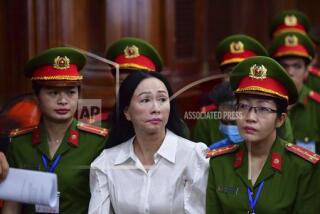Reformer Ousted From Top Hanoi Leadership
- Share via
BANGKOK, Thailand — In a realignment of power that appears to run counter to the liberalizing trend under way in Eastern Europe, Vietnam’s leadership has removed an outspoken reformer from the Communist Party Politburo and other top posts.
The ouster of Tran Xuan Bach, which was announced Wednesday night in Hanoi, left students of Vietnamese politics puzzled about what the move portends for the reform movement in Vietnam, which up to now has concentrated on economic liberalization. Bach was known to be pressing for political reforms as well.
Bach was stripped of his party jobs at the end of a 15-day party meeting called partly in response to liberalization in Eastern Europe.
A communique broadcast on Hanoi Radio accused Bach, 65, of having “violated the party’s organizational principles and discipline, leading to many bad consequences.”
The communique noted that the socialist world had become “enmeshed in a comprehensive and the most critical crisis ever seen before,” but it expressed confidence that socialism will emerge strengthened from its difficulties.
Since 1987, the Vietnamese have been pursuing a reform process they called doi moi, which has created dramatic improvements in the standard of living. Vietnam was one of the poorest countries when the war ended in 1975.
The Vietnamese party has recently stepped up criticism of officials and condemned corruption. But it has avoided the reforms advocated by Soviet President Mikhail S. Gorbachev, such as replacing the Communist power monopoly with a multi-party system and free elections.
Instead, the Vietnamese seem to be following the lead of China by trying economic reforms without political liberalization. Bach had criticized this approach, noting sardonically, “You can’t walk with one long leg and one short one.”
Bach, who had ranked ninth in the Politburo, had recently warned that Vietnam is not immune to the virus of democracy sweeping Eastern Europe. He warned that while economic pressures are subsiding, people are demanding more democracy and social justice.
In addition to his outspoken support of reforms, Bach also may have alienated members of Vietnam’s aging hierarchy by being seen as a political maverick in a country known for its secretive, collective leadership.
He was frequently mentioned by diplomats in Hanoi as a possible successor to party leader Nguyen Van Linh, who has been ill in recent months and could step down at the next party congress. The meeting is scheduled to be held in the second quarter of 1991.
In addition to his membership in the governing Politburo, Bach had joined the Central Committee in 1982 and became a secretary. He was responsible for the party’s foreign affairs and was recently given added duties in the arts and cultural affairs, which took him overseas frequently.
More to Read
Sign up for Essential California
The most important California stories and recommendations in your inbox every morning.
You may occasionally receive promotional content from the Los Angeles Times.













